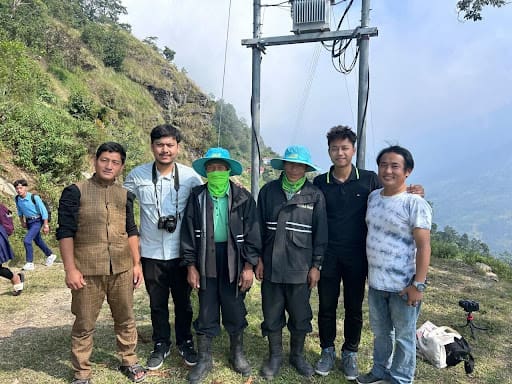By Shashank Dewan and Rohan Shrestha
Their early morning started with them following two gentlemen wearing dark blue overalls and very cool hats in the warm autumn sun. Both Rahul Bisunkhe and Sujit Man Shrestha, who are the co-founders of Paramendo, followed Akal Bahadur Tamang and Blek Lama Tamang from the village of Ree situated to the north of Dhading district, while they were collecting waste from different houses and littered across the goreto.

Team Paramendo
Paramendo, which means Rhododendron in the native language of Tamang people, was founded after the Makeathon in November 2022 under the project “Plastic to Ghar (P2G).
Paramendo isn’t just comprised of Sujit (who is a Mechanical Engineer) and Rahul (who is a Social Entrepreneur), it also includes Khasarki Tamang and Bishal Tamang from Ree village itself. The team was founded on a common ethos of addressing the escalating plastic waste problem in the village of Ree. The team is committed to addressing waste management issues, community empowerment, and sustainable solutions.
Even though Paramendo was established after the Makeathon, the need for such an entity was felt after the establishment of CRC (Community Recycling Center). This center was established with the support from Monaco Aide & Presence (MAP) and Doko Recyclers. This CRC covers an area of 6 Aanna (190.78 sq. m) and plays a pivotal role in collecting, segregating, and processing the plastic waste. Before Paramendo was formed, the collected plastic waste was piling up in this facility at an alarming rate. They were able to collect a staggering 9.5 tons of plastics within a year of construction of the facility. This also points to the fact that the community was engaged and aware of the positive sides of plastic waste management.
In order to solve the problem of piling up plastic wastes Paramendo thought of an ingenious idea, with the support from “Plastic to Ghar” project, of using the waste plastics from the village for the village. Their idea is to make plastic products from the collected waste for housing products.
They are currently working on two products:

LDPE Wraps/ Sheets
Utilized for preventing roof leakage and other related issues. LDPE is Low-density polyethylene, mostly found in plastic bags we use for groceries.

A kid checking out the PP and HDPE tiles (Recycled Tiles)
Recycled Tiles: Crafted from HDPE (High Density Polyethylene) and PP (Polypropylene), serving as roofing and flooring materials. HDPE is found in shampoo bottles whereas PP is prevalent in plastic chairs and other common plastic products.
These products are part of Paramendo’s holistic approach to create a circular economy within the village, empowering locals through employment opportunities and raising awareness about plastic-related problems.
Despite their success in most of the fronts they are battling in, it doesn’t mean they aren’t facing hurdles. One of the major challenges they are facing is the processing of MLP (multi-layered plastics), which we can find in chocolate, biscuits and noodle wrappers, since these types have different types of plastics mixed. However, they have seen this as an opportunity to diversify their product line by experimenting with baskets made out of MLP. In the meantime, they are searching for other avenues to utilize MLP in housing products as well.
Paramendo Nepal’s journey exemplifies the power of collaboration, community engagement, and innovative solutions in addressing critical environmental challenges. By transforming plastic waste into valuable products, Paramendo not only contributes to waste reduction but also empowers communities and fosters a circular economy. As they navigate challenges and pioneer sustainable practices, Paramendo stands as a beacon for others in the recycling space.
Would you kindly consider following Paramendo on both Instagram and Facebook? Doing so will provide you with more insights into their operations and activities.